コロナウイルス感染対策で、日本よりも諸外国の方が大胆な対策を講じています。万一、そのような時期にそのような国に出張していたらどうなるのか、それを考えさせるニュースがあったのでご紹介します。平和ボケの日本人は、大丈夫だろうか。
「フレンドシップクラブ便り2020.3.27」から現地情報を拾ってみた。< >内は私のコメント。
*****************************************************************************************
〇 怒り!! ウイルス禍 ルソン島全島閉鎖 日本大使館休館
フィリピンにお住まいの皆様及び旅行者の皆様へ
在フィリピン日本国大使館
1 3月16日のフィリピン政府による「ルソン地域全域へのコミュニティー隔離措置(Enhanced Community Quarantine)」の発表を受け,在フィリピン日本国大使館(マニラ)は,3月17日から当分の間臨時休業し、領事業務その他の業務を停止させていただきます。
2 ご不便をおかけしますが、ご理解のほどお願いいたします。
3 なお,休館期間中の緊急のご用件については,邦人援護ホットラインで承ります。
邦人援護ホットライン(24時間対応): Tel:(63-2)8551-5786
・・・・・・・・・・・・・・・
ひとりごと 大バカ野郎!!)<本当に。国が真っ先に逃げる!!おいおい>
フィリピン政府が、ルソン島全島封鎖を発表した日、マニラの日本大使館から、送られてきたものです。在留日本人が、突然の封鎖でパニックに陥っているのに、大使館が休館する。
政府に、外務省に、在外大使館は、何のためにあるのか、問いたい。
逃げまどう、途方に暮れている在留邦人を、そのままにして、連絡を絶つ。
これが、日本政府の在外公館が、日本国民に対する仕打ち?
あなたたちの目は、フィリピン政府に向いているのか?、日本国民ではないのか?
万死に値する。
発表直後から、クレームのあらしが押し寄せる、慌てて、休館を取りやめました。
そういうレベルの話ではない。
〇 外国人4500人が立ち往生、ホテル閉め出し(NNA PHILLIPINE 2020/3/25)
フィリピン政府がルソン島全域で外出制限を開始して以降、約4,500人の外国人旅行客がホテルから閉め出され、野宿を余儀なくされているようだ。
<もし、主張中だったらと思うとぞっとします。私の場合、知人・友人いるフィリピンは何とかなるが、誰も知り合いのいない国でこのようなことになったら?もちろん、出張には出張先があっていくので知り合いがゼロではないでしょうが、はたしてサポートしてくれるでしょうか。また、出張の途中で立ち寄った国の場合はどうでしょうか。ホテルの外は治安も悪く危険だらけのところもたくさんあります!!>
駐フィリピン欧州連合(EU)代表部のトーマス・ウィーアシング副代表が24日、ロクシン外相にこうした現状を訴えた。
ひとりごと)
外国人の入国拒否しても、滞在中の外国人は、大勢います。多くが、ホテルに宿泊しています。そのホテルを、営業停止にしたら、泊るところがなくて、困るのは、目に見えています。
政府のやることがわかりません。
数日後、ホテルが外国人受け入れはじめました。これが、フィリピンです。
〇マニラ首都圏隔離措置、3月15日から1カ月間
人の出入り原則禁止、日本等からの入国制限も(フィリピン経済・金融・投資2020/03/13)
ドゥテルテ大統領は、国内の新型コロナウイルス(Covid-19)感染者が52人に増えたことから、12日夜、警戒レベルを最高のコード・レッド・サブレベル2に引き上げた。
そして、
1.マニラ首都圏の全てのレベルの学校を4月12日まで閉鎖、
2.期間内の大規模イベント・集会の禁止
3.マニラ首都圏全体について、1カ月間(3月15日~4月14日)の隔離措置を発動する
と発表した。
在フィリピン日本大使館等によると、マニラ首都圏についての隔離措置などは以下のとおり。
・マニラ首都圏全体について隔離措置(マニラ首都圏と他地域との人の移動禁止など)をとる。それ以外の地方は、異なる家庭から二人の患者が出た段階でバランガイ隔離。
二つのバランガイに出た段階で市町村等のレベルで隔離、二つの市町村等に出た段階で州全体を隔離する
(アニョ内務地方自治大臣は、マニラ首都圏外からマニラ首都圏への通勤は、マニラ首都圏で雇用されていることの証明を提示すれば可能と発言)。
・行政機関は期間中機能停止。ただし最低限の職員は維持。公衆衛生等は完全に機能させる。立法・司法も同様にすることを勧告
・民間企業には柔軟な業務体制を取ることを推奨。
DOLE(労働雇用省)・DTI(貿易産業省)がガイドラインを発出。製造・小売り・サービス業は営業継続を勧告。
・首都圏内の公共交通機関は原則として継続して運航するが、首都圏に出入りする陸路、内航船舶、国内便航空機は
3月15日に停止。
・上記措置は毎日モニターし決定から毎日再評価する。上記措置は、フィリピン国家警察やフィリピン国軍によって実施される。
・マニラ首都圏以外の地方自治体(LGU)は学校の閉鎖に裁量を有する。
・フィリピン人国外労働者(OFW)は、湖北省を除く中国本土に、危険を理解する旨の誓約書に署名して渡航することが認められる。
・国内感染が起きている国(日本を含まない)からの渡航者は入国制限を課される。
ただし、フィリピン人及びその外国人配偶者・子、フィリピン政府が発行した永住査証所持者、9(e)外交査証所持者は除く。
なお、ドゥテルテ大統領は「マニラ首都圏隔離措置は、戒厳令とは全く異なるもので政治的目的を有するものではない。純粋に新型コロナウイルス感染拡大を防ぐための措置である」とコメントした。
<日本からはなかなか海外の国々の詳細が見えないので、このような情報を共有できるのは心強い。出張前に相手国の治安などは当然調べていましたが、今後はコロナウイルス対策のような予防措置が取られることも意識の片隅に置いておく必要がありますね>

「フレンドシップクラブ便り2020.3.27」から現地情報を拾ってみた。< >内は私のコメント。
*****************************************************************************************
〇 怒り!! ウイルス禍 ルソン島全島閉鎖 日本大使館休館
フィリピンにお住まいの皆様及び旅行者の皆様へ
在フィリピン日本国大使館
1 3月16日のフィリピン政府による「ルソン地域全域へのコミュニティー隔離措置(Enhanced Community Quarantine)」の発表を受け,在フィリピン日本国大使館(マニラ)は,3月17日から当分の間臨時休業し、領事業務その他の業務を停止させていただきます。
2 ご不便をおかけしますが、ご理解のほどお願いいたします。
3 なお,休館期間中の緊急のご用件については,邦人援護ホットラインで承ります。
邦人援護ホットライン(24時間対応): Tel:(63-2)8551-5786
・・・・・・・・・・・・・・・
ひとりごと 大バカ野郎!!)<本当に。国が真っ先に逃げる!!おいおい>
フィリピン政府が、ルソン島全島封鎖を発表した日、マニラの日本大使館から、送られてきたものです。在留日本人が、突然の封鎖でパニックに陥っているのに、大使館が休館する。
政府に、外務省に、在外大使館は、何のためにあるのか、問いたい。
逃げまどう、途方に暮れている在留邦人を、そのままにして、連絡を絶つ。
これが、日本政府の在外公館が、日本国民に対する仕打ち?
あなたたちの目は、フィリピン政府に向いているのか?、日本国民ではないのか?
万死に値する。
発表直後から、クレームのあらしが押し寄せる、慌てて、休館を取りやめました。
そういうレベルの話ではない。
〇 外国人4500人が立ち往生、ホテル閉め出し(NNA PHILLIPINE 2020/3/25)
フィリピン政府がルソン島全域で外出制限を開始して以降、約4,500人の外国人旅行客がホテルから閉め出され、野宿を余儀なくされているようだ。
<もし、主張中だったらと思うとぞっとします。私の場合、知人・友人いるフィリピンは何とかなるが、誰も知り合いのいない国でこのようなことになったら?もちろん、出張には出張先があっていくので知り合いがゼロではないでしょうが、はたしてサポートしてくれるでしょうか。また、出張の途中で立ち寄った国の場合はどうでしょうか。ホテルの外は治安も悪く危険だらけのところもたくさんあります!!>
駐フィリピン欧州連合(EU)代表部のトーマス・ウィーアシング副代表が24日、ロクシン外相にこうした現状を訴えた。
ひとりごと)
外国人の入国拒否しても、滞在中の外国人は、大勢います。多くが、ホテルに宿泊しています。そのホテルを、営業停止にしたら、泊るところがなくて、困るのは、目に見えています。
政府のやることがわかりません。
数日後、ホテルが外国人受け入れはじめました。これが、フィリピンです。
〇マニラ首都圏隔離措置、3月15日から1カ月間
人の出入り原則禁止、日本等からの入国制限も(フィリピン経済・金融・投資2020/03/13)
ドゥテルテ大統領は、国内の新型コロナウイルス(Covid-19)感染者が52人に増えたことから、12日夜、警戒レベルを最高のコード・レッド・サブレベル2に引き上げた。
そして、
1.マニラ首都圏の全てのレベルの学校を4月12日まで閉鎖、
2.期間内の大規模イベント・集会の禁止
3.マニラ首都圏全体について、1カ月間(3月15日~4月14日)の隔離措置を発動する
と発表した。
在フィリピン日本大使館等によると、マニラ首都圏についての隔離措置などは以下のとおり。
・マニラ首都圏全体について隔離措置(マニラ首都圏と他地域との人の移動禁止など)をとる。それ以外の地方は、異なる家庭から二人の患者が出た段階でバランガイ隔離。
二つのバランガイに出た段階で市町村等のレベルで隔離、二つの市町村等に出た段階で州全体を隔離する
(アニョ内務地方自治大臣は、マニラ首都圏外からマニラ首都圏への通勤は、マニラ首都圏で雇用されていることの証明を提示すれば可能と発言)。
・行政機関は期間中機能停止。ただし最低限の職員は維持。公衆衛生等は完全に機能させる。立法・司法も同様にすることを勧告
・民間企業には柔軟な業務体制を取ることを推奨。
DOLE(労働雇用省)・DTI(貿易産業省)がガイドラインを発出。製造・小売り・サービス業は営業継続を勧告。
・首都圏内の公共交通機関は原則として継続して運航するが、首都圏に出入りする陸路、内航船舶、国内便航空機は
3月15日に停止。
・上記措置は毎日モニターし決定から毎日再評価する。上記措置は、フィリピン国家警察やフィリピン国軍によって実施される。
・マニラ首都圏以外の地方自治体(LGU)は学校の閉鎖に裁量を有する。
・フィリピン人国外労働者(OFW)は、湖北省を除く中国本土に、危険を理解する旨の誓約書に署名して渡航することが認められる。
・国内感染が起きている国(日本を含まない)からの渡航者は入国制限を課される。
ただし、フィリピン人及びその外国人配偶者・子、フィリピン政府が発行した永住査証所持者、9(e)外交査証所持者は除く。
なお、ドゥテルテ大統領は「マニラ首都圏隔離措置は、戒厳令とは全く異なるもので政治的目的を有するものではない。純粋に新型コロナウイルス感染拡大を防ぐための措置である」とコメントした。
<日本からはなかなか海外の国々の詳細が見えないので、このような情報を共有できるのは心強い。出張前に相手国の治安などは当然調べていましたが、今後はコロナウイルス対策のような予防措置が取られることも意識の片隅に置いておく必要がありますね>






















